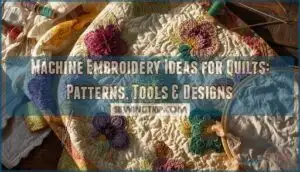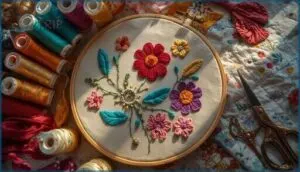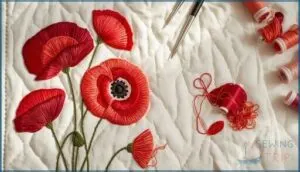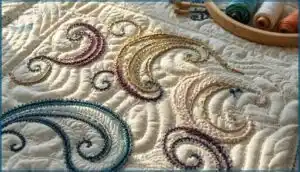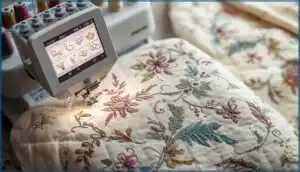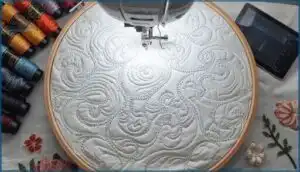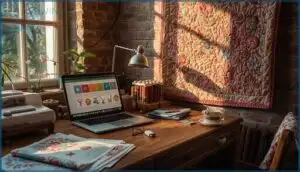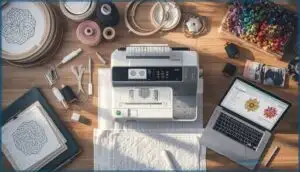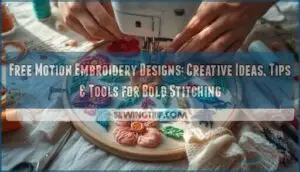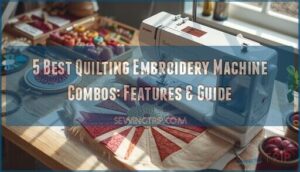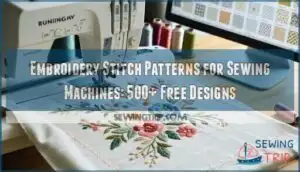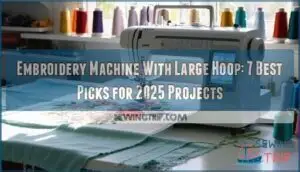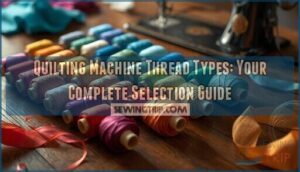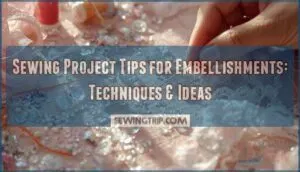This site is supported by our readers. We may earn a commission, at no cost to you, if you purchase through links.
Your embroidery machine can do more than monograms and decorative stitches. It’s a powerful quilting tool that transforms plain fabric into textured, dimensional art.
Machine embroidery ideas for quilts range from delicate florals that dance across blocks to bold geometric patterns that command attention. You can add whimsical bees to a baby quilt or create stunning edge-to-edge designs that rival hand quilting.
The best part? You’ll finish projects in hours instead of weeks. With the right patterns, tools, and techniques, your machine becomes a creative partner that brings personality to every quilt you make.
Table Of Contents
Key Takeaways
- Your embroidery machine cuts quilting time by 40% compared to hand stitching while delivering professional edge-to-edge patterns that rival expensive long-arm services.
- Floral designs, geometric patterns, and themed blocks like bees work across hoop sizes from 4×4 to 10×16 inches, with most projects finishing in 60-120 minutes.
- Platforms like Etsy, Embroidery Library, and Anita Goodesign offer thousands of downloadable quilting designs in multiple formats (DST, PES, JEF) for $3-$10 per pattern.
- Light mesh cut-away stabilizers paired with 40-50 weight thread and 75/11 sharp needles prevent puckering and deliver clean stitches through quilt layers.
Creative Machine Embroidery Ideas for Quilts
Machine embroidery opens up a world of creative possibilities for quilters. You can add personality to your projects with everything from delicate florals to bold geometric shapes.
Here are some popular design styles that work beautifully on quilts.
Floral Quilt Embroidery Designs
Floral designs bring life to your quilts. Roses, poppies, and leaves work beautifully in sizes from 3 to 12 inches. Your embroidery machine can handle these botanical motifs with ease. The designs often use repeating patterns for visual appeal.
Consider these floral design trends for your next project:
- Single run stitches create softer, lighter quilting with subtle texture
- Triple bean stitches add depth and dimension to flower petals
- Thread color palettes range from naturalistic tones to vibrant, unexpected combinations
- Stabilizer type affects how crisp your floral details appear
- Design scaling tips: avoid resizing beyond 10% to maintain stitch density effects
Most designs take 60 to 120 minutes depending on complexity.
Geometric and Abstract Patterns
Geometric shapes bring pattern precision to your quilts—think squares, triangles, and hexagons. These embroidery designs fit hoops from 4×4 to 10.5×16 inches, giving you design versatility. Abstract patterns let you experiment with color experimentation and random compositions.
The aesthetic influence is clear: geometric quilting designs have surged 25% in popularity since 2022. Market trends show these machine embroidery styles cut completion time by 40%. Quilters should also consider using quality threads for durability to guarantee longevity.
Themed Quilt Blocks (e.g., Bees, Holidays)
Themed quilt blocks let your personality shine through your work. Bee quilt block designs are especially hot right now, with stitch counts ranging from 5,300 to 14,600 depending on design complexity.
Holiday embroidery machine quilt patterns for Christmas and Halloween offer seasonal popularity—they make up about 25% of sales each fall. Color palettes are easy to adjust in most files, giving you solid customization options for machine embroidery.
Border and Edge-to-Edge Embroidery
Border embroidery design ideas take your quilts from good to gallery-worthy. Edge-to-edge quilting creates continuous patterns across the entire surface, mimicking long-arm results with your home machine. You’ll find designs in hoop sizes from 4×4 up to 10×16 inches, with reverse files included for easy piecing.
- Flawless borders join perfectly for longer runs
- Continuous patterns flow without dense or sparse spots
- Professional finishes rival expensive quilting services
Most border embroidery design files work across multiple machine formats.
Using Appliqué Embroidery in Quilting
Appliqué embroidery brings fabric shapes and textures into your quilts with precision you can’t get by hand. Your embroidery machine manages the tricky parts like perfect placement and tight stitching.
Let’s look at how different appliqué formats work, when to choose machine over traditional methods, and where to find inspiration for your next quilt block.
Multi-Formatted Appliqué Designs
Multi-formatted appliqué embroidery designs work across different machine brands without conversion headaches. You can use the same pattern whether you’ve got ART, DST, PES, or JEF files.
Most designs fit hoops around 150mm x 275mm. This design compatibility means you’re not locked into one format.
You’ll find these appliqué embroidery files ranging from $50 to $60 per pattern set online.
Traditional Vs. Machine Appliqué
Handmade durability has always been the benchmark in quilting. Hand appliqué creates softer stitches that move with fabric, while machine speed offers tight, consistent results.
Your embroidery machine delivers precision in minutes versus hours of hand stitching. Cost comparison? Machine appliqué cuts labor dramatically.
Stitch quality depends on your technique—both methods shine in different ways. Artistic evolution means blending tradition with modern appliqué embroidery designs for your unique quilt vision.
Appliqué Quilt Block Inspiration
Floral motifs like poppies and roses lead the pack in applique embroidery designs, offering timeless versatility for any quilt block. Trending themes like bee patterns symbolize sustainability, while geometric blocks dominate modern quilts with 20% of new downloads. Seasonal motifs capture about 15% of sales, and animal themes add playful charm. Machine embroidery for quilting brings these visions to life faster than ever.
Popular Embroidery Quilt Block Patterns
You’ve got endless options regarding embroidery quilt block patterns. Some designs work beautifully on their own, while others shine when you repeat them across your quilt.
Let’s look at five popular patterns that quilters reach for again and again.
Poppies and Flower Quilt Blocks
Poppies bring gardens to life on fabric with their delicate petals and flowing lines. These flower quilt block embroidery designs come in up to 19 sizes, from 3 to 12 inches, giving you flexibility for any project. The design file variety includes formats like DST, PES, and JEF, so most embroidery machines can handle them.
- Single-run stitching techniques keep your quilting designs soft and light
- Block applications range from pillows to edge-to-edge quilt patterns
- Market pricing starts around $5, with bundles reaching $30 or more
Practice on scrap fabric first. Your embroidery machine works best with proper stabilizer and thread tension. Don’t resize the poppy design more than 10% or you’ll lose stitch quality.
Swirl and Circle Embroidery Blocks
Swirl and circle embroidery designs create movement across your quilt block with their flowing, concentric patterns. These quilting designs come in sizes from 6×6 to 12×12 inches, fitting multiple hoop options.
Design layering and echo quilting add textured depth you can feel. Stitch density stays low for softer results.
Size considerations matter—don’t resize beyond 10%. Fabric stabilization with spray starch prevents puckering during machine embroidery.
Bee and Honeycomb Quilt Designs
Honeycomb geometry paired with bee motifs brings a whimsical touch to your quilting projects. These embroidery designs work beautifully for memory quilts or seasonal quilt patterns.
Design customization lets you scale from 4×4 to 10.5×16 inch hoops across 13 sizes. Thread selection matters—polyester holds up best.
Your embroidery machine performs continuous edge-to-edge stitching, saving thread while creating gapless quilting designs.
Built-in Embroidery Machine Patterns
Most embroidery machines come loaded with ready-to-use machine embroidery quilting options—think feathers, swirls, florals, and seasonal icons. Some models pack in up to 294 built-in embroidery machine patterns, giving you serious stitch variety and design libraries to explore.
Pattern customization lets you resize and preview before stitching. Multi-needle setups boost machine efficiency by auto-switching thread options, so you spend less time fussing and more time creating.
Stipple and Meander Designs
Beyond built-in motifs, stipple and meander patterns rule for their beginner friendliness and adaptable design density. Here’s why they’re quilting goldmines:
- Thread weight stays light with single-ply stitches—no bulk
- Pattern scaling fits 2×2″ to 12×12″ blocks effortlessly
- Software integration works across 90% of embroidery platforms
- Freemotion quilting effects minus the learning curve
- Design density covers backgrounds without overwhelming appliqués
They’re your workhorse for polished machine embroidery quilting designs.
Where to Find Embroidery Designs for Quilts
You don’t have to hunt forever to find great embroidery designs for your quilts. There are plenty of reliable sources where quilters grab downloadable files and patterns.
Let’s look at some of the best places to find designs that’ll work with your embroidery machine.
Etsy Quilt Embroidery Files
When you’re hunting for quilting designs, Etsy is a goldmine. You’ll find over 10,000 downloadable files covering hearts, bees, and stipple patterns. Most sellers offer multi-formatted embroidery files compatible with DST, PES, and JEF machines. Prices generally run $3 to $10 per design, with bundles saving you cash. User ratings shine at four and five stars, reflecting solid design variety and file compatibility.
| Design Type | Price Range | Size Options |
|---|---|---|
| Single Patterns | $3 – $10 | 10-27 sizes |
| Design Bundles | $15 – $40 | 5-20 designs |
| Edge-to-Edge | $5 – $12 | Multiple formats |
| Themed Blocks | $4 – $10 | 20+ sizes |
| Floral Motifs | $3 – $8 | Various hoops |
Kimberbell and Clear Blue Tiles
If you’re looking for precision alongside innovation, Clear Blue Tiles from Kimberbell open up all-over quilting on your embroidery machine. These marked tiles guide fabric placement for continuous stitching, mimicking longarm results. Their Machine Embroidery Club drops fresh quilting designs monthly for $89.95 annually.
Here’s what sets them apart:
- Blue-coded files work seamlessly with tiles for edge-to-edge patterns.
- Orange designs target individual quilt blocks without back-side stitching.
- Expansion sets now include tiles up to 10×16 inches for larger hoops.
- Video tutorials and live events make complex techniques feel approachable.
Anita Goodesign and Embroidery Library
Two powerhouses dominate the quilting world. Anita Goodesign boasts 22 years of machine embroidery designs sorted by Animals, Americana, and Baby themes. Their In-the-Hoop technique eliminates manual centering—blocks stitch perfectly every time. Embroidery Library delivers Edge-to-Edge quilting patterns with 40.5K Instagram followers driving user engagement. Both platforms offer regular design updates, keeping your embroidery machine loaded with fresh quilting designs.
| Feature | Anita Goodesign | Embroidery Library |
|---|---|---|
| Design Organization | 22+ years of categorized collections | Instagram-driven trend catalog |
| Specialty | In-the-Hoop blocks, four sizes | Edge-to-Edge continuous stitching |
| User Support | Two downloads per purchase | Written tutorials, quilting patterns |
DIME and Creative Fabrica
DIME software transforms quilting integration with My Quilt Planner, creating king-size layouts plus 99 continuous quilting designs. Their embroidery machine formats work across major brands.
Creative Fabrica counters with 93,000+ embroidery designs and commercial design licensing—you can sell finished quilts without copyright worries.
Both platforms dominate user popularity rankings. DIME excels at quilting patterns, while Creative Fabrica wins on sheer variety and machine embroidery flexibility.
Essential Tools and Software for Machine Embroidery Quilting
You can’t really get the most out of machine embroidery without the right tools backing you up. The software you choose matters just as much as your machine itself.
Here’s what you need to know about the essential programs and accessories that’ll make your quilting projects smoother and more creative.
Hatch by Wilcom Features
Hatch by Wilcom is embroidery software that simplifies machine embroidery quilting from start to finish. The user interface feels natural, with helpful hints built right in.
Here’s what makes it stand out:
- Digitizing tools convert your images into embroidery-ready files with impressive precision.
- Machine integration accommodates multiple formats, so your files work seamlessly across different embroidery machines.
- Creative tools include 124 fonts and refined stitch quality controls for professional results.
SewWhat-Pro Capabilities
SewWhat-Pro is embroidery software that gives you serious control over your quilting designs. You can resize patterns, adjust stitch density, and convert files between formats without breaking a sweat.
| Feature | What It Does | Why It It Matters |
|---|---|---|
| Stitch Editing | Delete, reorder, rotate individual stitches | Fine-tune your design manipulation |
| File Conversion | Accommodates Singer, Brother, Janome, Bernina formats | Works with your embroidery machine |
| Thread Management | Track colors across 15+ manufacturer palettes | Simplifies project optimization |
The software processes TrueType fonts, too. You’ll create custom monograms and text embroidery right from your computer’s font library.
Embroidery Machine Compatibility and Tips
Your embroidery machine needs the right setup to handle quilting designs smoothly. Most machines support common file formats like PES, DST, JEF, and EXP, so check your manual before downloading patterns.
- Hoop sizes ranging from 4×4 to 8×12 inches determine your design possibilities
- Needle choice matters—a 75/11 sharp works best through quilt sandwich layers
- Stitch settings between 650-1,000 stitches per minute balance speed with quality
Brother, Janome, and Husqvarna Viking are popular machine brands among quilters.
Recommended Embroidery Accessories for Quilting
The right accessories turn your embroidery machine into a quilting powerhouse. Start with quality embroidery threads in rayon or metallic finishes for vibrant quilting designs. Pair them with light mesh cut-away stabilizers to prevent puckering.
Needle sizes 7-8 work perfectly for beginners. Add specialty presser feet like the Quarter Inch or Open Toe for precision stitching your quilt blocks.
Frequently Asked Questions (FAQs)
How do I choose the right thread weight for quilting?
Think of thread weight like choosing paint brushes—finer brushes for delicate details. Use 40 wt or 50 wt thread for most quilting projects. They balance strength with stitch visibility beautifully.
Can I embroider on pre-quilted fabric layers?
Yes, you can embroider on pre-quilted fabric layers with proper stabilizer options and fabric preparation.
Use cutaway stabilizers with adhesive spray, adjust thread tension carefully, and test hooping techniques on scrap quilted fabric first.
What stabilizers work best for quilt embroidery projects?
Like a foundation beneath a masterpiece, the right stabilizer holds everything together. Light mesh cut-away works beautifully for quilt blocks, while tear-away suits stable quilting fabrics.
Wash-away types and fusible woven options support delicate embroidery machine work perfectly.
How do I prevent puckering when embroidering thick quilts?
Prevent puckering by using proper hoop tension and cut-away stabilizers for thick quilts.
Match heavy needles (90/14 to 110/18) with your thread weight.
Balance tension settings and reduce machine speed to minimize fabric stress during embroidery.
Should I hoop or use hoopless methods for quilting?
Both methods work well. Hooping gives you better fabric stabilization and stitch quality for complex quilting designs.
Hoopless methods suit larger quilt size projects when your machine throat space is tight.
Conclusion
Think of your embroidery machine as a paintbrush that never runs out of color. You’ve got the patterns, tools, and machine embroidery ideas for quilts to transform plain fabric into something special.
Start with one simple design. Watch those stitches bring your blocks to life. Each project builds your confidence and skill.
Your next quilt won’t just keep someone warm. It’ll tell a story only you can create.
- https://www.ggdesignsembroidery.com/free-stippling-stitches.html
- http://fivestarfonts.com/free-diamond-quilted-frame
- https://www.kreativekiwiembroidery.co.nz/Download-Free-In-the-hoop-Embroidery-Designs
- https://www.etsy.com/listing/1808703963/flower-quilt-embroidery-design-26-quilt
- https://www.truedigitizing.com/blog/embroidery-trends-whats-hot

